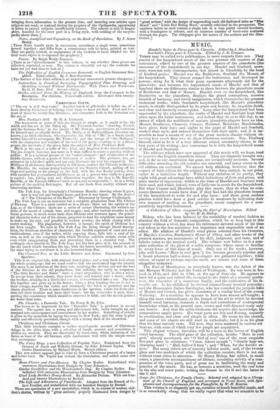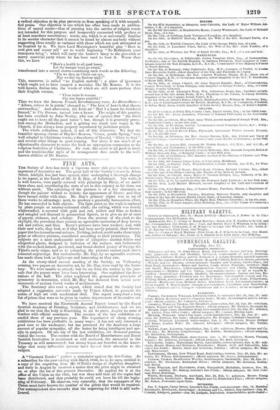Songs for Christmas, for Family Choirs. Selected and adopted by
a Clergy- man of the Church of England, and arranged in Vocal Score, with Sym- phonies and Accompaniments for the Pianoforte, by W. H. Kearns.
This volume is so elegantly got up, contains so'much beautiful music, and is so remarkably cheap, that we really regret that what we conceive to be
a radical objection to its plan prevents us from speaking of it with unquali- fied praise. Our objection is one which has often been made to publica- tions of sacred music-that of pressing into the service of religion music not intended for this purpose, and inseparably connected with profane or at least mundane associations; music, too, which is so universally familiar in its secular character that it cannot be heard by almost anybody without suggesting ideas totally at variance with those which are now attempted to be inspired by it. We have Lord Mornington's beautiful glee "Here in cool grot and mossy cell" set to words beginning "To Bethlehem your transports bring"; which will carry the hearer's fancy to the glee-club or merry convivial party where he has been used to hear it. Worse than this, we have "Here's a health to all good lasses,
Let the bumper toast go round,"
transformed into a sacred chorus containing such words as the fbllowing, "Fix we then on Christ our eye, May we feel the Saviour nigh!" • This, moreover, is called ` an English melody "; a piece of ignorance which ought not to have escaped a musician like Mr. Kearns. It is the well-known Italian trio, the words of which are still more profane than their English version, " Vivan tutte le vezzoze, Che non hanno crudelta!"
Then we have the famous French Revolutionary tune, La Marsealaise- ".Allons, enfans de la patrie," changed to," The Kest of heav'n that throne surrounding." And afterwards, the Irish air " Had I a heart for falsehood framed," in The Duenna, turned into a hymn. The origin of this practice has been ascribed to John Wesley, who was of opinion that "the Devil ought not to have all the good tunes "; but, though it is generally preva- lent among the Methodists, and is getting too much into vogue in the Church, it has always been properly reprobated by judicious people.
The whole collection, indeed, is not of this character. We find the beautiful opening chorus of Haydn's Seasons, "Come, gentle Spring," very well adapted to Christmas words; a fine chorus of Handel, "Glory to God "; and several other things in good keeping. But there is too much of an objectionable character to make the book an appropriate companion to the religious festivities of Christmas. Du rests, the music is all good in itself, and the musician-like style of its arrangement does credit to the well- known abilities of Mr. Kearns.



























 Previous page
Previous page